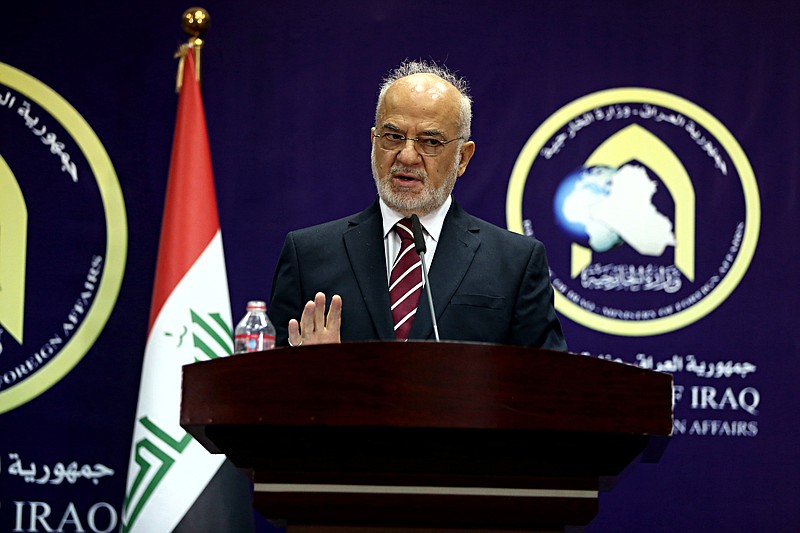BAGHDAD - I just spent eight days traveling with the Air Force to all of its key forward bases in Afghanistan, Iraq, Kuwait, Qatar and the United Arab Emirates. So the president's speech Monday night was very timely for me. It was also unnerving.
It was so full of bombast and clichés, so larded with phrases like "we will break their will," so lacking in details and, most of all, so lacking in humility in confronting a problem and a region that has vexed better men for ages that I still don't know where he's going - only that he is going there very definitively.
Let me explain what I saw here - three things in particular: I saw a new way of mounting warfare by the United States in Iraq. I saw in this new warfare a strategy that offers at least a glimmer of hope for Iraq, if and when ISIS is defeated. But, though only a glimpse, I saw in Afghanistan an eroding stalemate - with all the same issues that have undermined stability there for years: government corruption, distrust among Afghans and perfidious interventions by Pakistan and Iran.
For years we've measured our involvement in Middle East wars by one pair of indexes - boots on the ground and killed in action. Because of that, most Americans are now paying scant attention to Iraq, where our boots on the ground have shrunk to a few thousand and where there have been just 17 U.S. military deaths since we re-engaged in Iraq to defeat ISIS in 2014.
The real story is wings in the air. We are involved in a gigantic military enterprise in Iraq. But it's with massive conventional air power married to unconventional special forces, who are advising the Iraqi army that is actually doing the ground fighting.
Ironically, it may never have happened had President Barack Obama not withdrawn our combat troops from Iraq in 2011, because Iraqis couldn't agree on a legal formula for their staying.
After that, the then-Shiite-led Iraqi government began abusing Sunnis, and ISIS emerged in response. Obama then slowly reintroduced U.S. Special Forces back into Iraq and, for the first time, sending some into Syria, but in a totally new context. When George W. Bush invaded Iraq in 2003 to topple Saddam Hussein, we destroyed the government from the top down. We toppled Saddam's statue. It became our war.
Even though ISIS emerged after we left, we have now returned at the invitation of Iraqis from the bottom up - making our presence much more legitimate and sustainable for any long fight. Iraqi Sunnis, Shiites and Kurds were forced to unify, at least minimally, to defeat ISIS, opening new possibilities. This is Iraq's war of liberation. They own it.
I met Marine Col. Seth Folsom, who commands a forward special operations air base, Al-Asad, in the western Iraqi desert.
"I was here in 2003 and in 2008," he told me. In those days, if he had a convoy going through a town it would speed 100 mph not to get shot at or blown up, pushing Iraqi cars out of the way, creating resentments. "Now we are driving with the Iraqis. It doesn't even seem like the same country to me. Now I am saying to my Iraqi counterparts, 'What do you want to do?'"
Alas, the war in Afghanistan is different. The air power component is there, but U.S. Special Forces are still doing too much fighting and dying. And Trump talked Monday night like they will now do more. And we don't have the legitimacy you now feel in Iraq.
Personal security for our Afghan allies is still minimal. I stood on the tarmac at Bagram Airfield and listened to a U.S.-trained Afghan pilot tell me that the last thing he does before climbing into the cockpit is call home to be sure his kids have not been abducted by the Taliban, who know that he works with the U.S. and have threatened him repeatedly. Again, that this pilot is still ready to fly with the U.S. takes real courage. He wants something different for his country, and he's not alone. But is he in the majority? Clearly he's got neighbors who don't think that we, or the Afghan government we're supporting, are legitimate. Culture trumps strategy.
This is going to take ages to fix, and if you fix Afghanistan, well, you fix Afghanistan. So what. If you fix Iraq with a real power-sharing accord you create a model that can radiate out across the Arab world, because Iraq is a microcosm of the Arab world, with Sunnis, Shiites, Kurds, Turkmen, Christians and many others.
The New York Times
